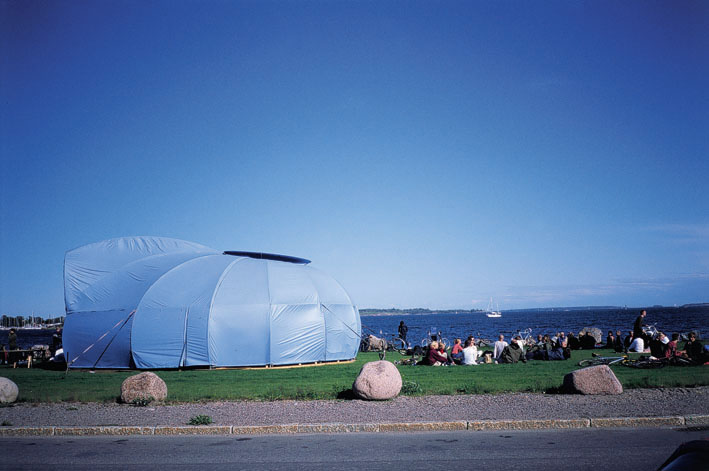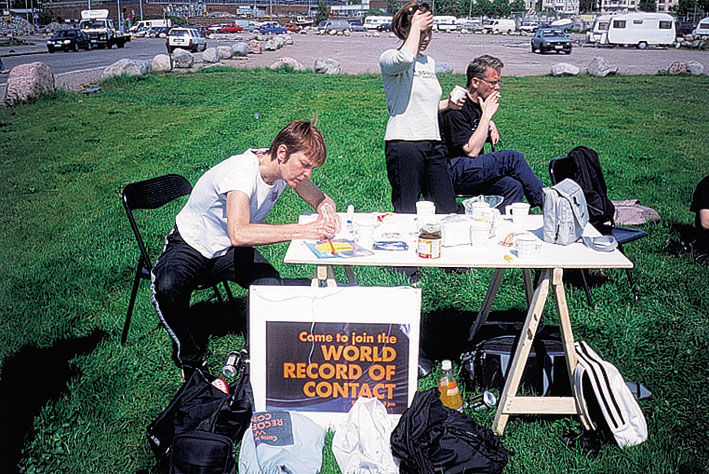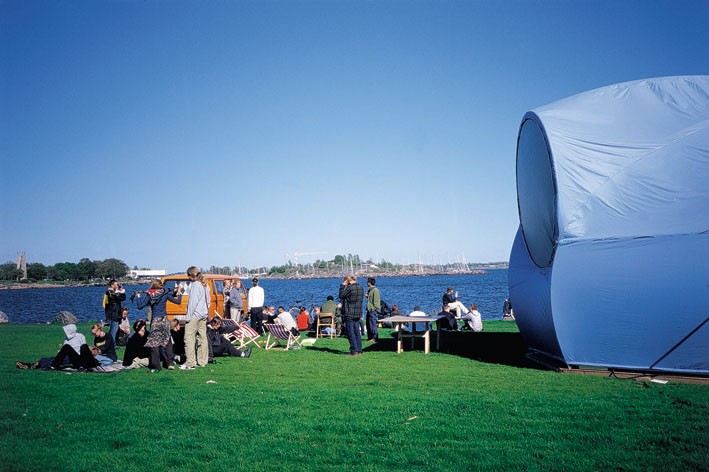Helsinki , 2000
LONELINESS IN THE CITY
To create a world Record of Contact: an event where everyone would bring his or her mobile phone and call one of the other anonymous participants. At the same time there could be real contact with the person, because everyone was present at the same spot. The mobile phone connects people but also creates the illusion of contact.
TRAVELLING PROJECT:
CBK DORDRECHT;
MUSEUM ABTEIBERG, MÖNCHENGLADBACH;
MACBA, BARCELONA;
KIASMA, HELSINKI;
MIGROS MUSEUM, ZURICH.
DONATED TO THE COLLECTION OF NMAC MONTENMEDIO, CÁDIZ
The goal of the project in Helsinki was to create a world Record of Contact: an event where everyone would bring his or her mobile phone and call one of the other anonymous participants. At the same time there could be real contact with the person, because everyone was present at the same spot. The mobile phone connects people but also creates the illusion of contact. As Helsinki is the hometown of Nokia, it seemed an appropriate place to question the function and influence of the mobile phone.
Loneliness in the City is a long-term research project about loneliness in modern urban life. For a number of years this theme played an important role in the work of Alicia Framis and has been elaborated on in several different forms.
For Loneliness in the City Framis collaborated with the artist Dré Wapenaar to design a mobile platform as the a-topical place where artists, architects and the public could develop and exchange ideas. The oval-shaped pavilion or tent of approximately 12×9 metres contains five sleeping cabins for the participants; the rest of the tent is public space. The pavilion is a research laboratory where ideas are investigated and immediately tested in reality. At the same time it is a community space to meet and relax. An intensive programme of workshops, performances, special video programmes, music and interactive events was organized for each city, to tie in with local issues and participants.
From Mönchengladbach to Dordrecht, to Barcelona, Helsinki and Zurich, insight into the general causes and corners of loneliness gradually grew and alternative strategies for interaction between people in the city were devised.
The programme in Dordrecht concentrated on creating a-topical places – places that do not have a preconceived or predefined function or purpose. The workshops ended up focusing on conquering or claiming space. A public place can become private or intimate by giving it new functions or meanings; conversely, a formerly private space can become a public one.
Guests:
Olivier Calix/curator Spain
Marco Cops/artist Holland
Ana Guiterez/masseuse Spain
Anna Guarro/curator Spain
Una Henry/artist Ireland, Holland
Haraldur Jonsson/artist Ireland
EI-Hadji-N’diaye/musician Senegal
Tiina Tuurna/artist Finland
Inari Vrimakoski/artist finland
Voukkoset and Nisakas,Laura and Nikolai/musicians Finland



The goal of the project in Helsinki was to create a world Record of Contact: an event where everyone would bring his or her mobile phone and call one of the other anonymous participants. At the same time there could be real contact with the person, because everyone was present at the same spot. The mobile phone connects people but also creates the illusion of contact. As Helsinki is the hometown of Nokia, it seemed an appropriate place to question the function and influence of the mobile phone.
Loneliness in the City is a long-term research project about loneliness in modern urban life. For a number of years this theme played an important role in the work of Alicia Framis and has been elaborated on in several different forms.
For Loneliness in the City Framis collaborated with the artist Dré Wapenaar to design a mobile platform as the a-topical place where artists, architects and the public could develop and exchange ideas. The oval-shaped pavilion or tent of approximately 12×9 metres contains five sleeping cabins for the participants; the rest of the tent is public space. The pavilion is a research laboratory where ideas are investigated and immediately tested in reality. At the same time it is a community space to meet and relax. An intensive programme of workshops, performances, special video programmes, music and interactive events was organized for each city, to tie in with local issues and participants.
From Mönchengladbach to Dordrecht, to Barcelona, Helsinki and Zurich, insight into the general causes and corners of loneliness gradually grew and alternative strategies for interaction between people in the city were devised.
The programme in Dordrecht concentrated on creating a-topical places – places that do not have a preconceived or predefined function or purpose. The workshops ended up focusing on conquering or claiming space. A public place can become private or intimate by giving it new functions or meanings; conversely, a formerly private space can become a public one.
Guests:
Olivier Calix/curator Spain
Marco Cops/artist Holland
Ana Guiterez/masseuse Spain
Anna Guarro/curator Spain
Una Henry/artist Ireland, Holland
Haraldur Jonsson/artist Ireland
EI-Hadji-N’diaye/musician Senegal
Tiina Tuurna/artist Finland
Inari Vrimakoski/artist finland
Voukkoset and Nisakas,Laura and Nikolai/musicians Finland